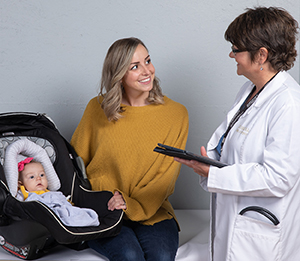Caring for Yourself After Childbirth: Physically and Emotionally
Postpartum care
After having your baby, you will continue to be watched and get pain relief, if needed. You and your baby usually stay at the hospital for a couple of days to recover.
What does recovering from childbirth involve?
As you recover, symptoms you may have include:
-
Bloody vaginal discharge that changes to brown, then whitish over the next few weeks after delivery.
-
A tender vaginal area.
-
Painful contractions that may continue after delivery as the uterus goes back to its original size.
-
Breast engorgement as you start to make breast milk.
-
Fatigue and soreness, which are common in the first few weeks.
It's advised that you make an appointment with your doctor 6 weeks after delivery to check that you're healing correctly.

The first few weeks
During the first few weeks, you need to take good care of yourself to rebuild your strength. These things can help:
-
If you can, take naps when the baby naps. This can help make up for lost sleep at night from getting up to feed the baby.
-
Wear a supportive bra. Cold packs may help relieve breast engorgement and swelling. Warm compresses can be used to help stimulate the let-down of milk. Let-down is a reflex that sets off the release of breast milk. If you choose not to breastfeed, use ice packs and bind your breasts for several days to help ease engorgement.
-
If stitches were needed during a vaginal delivery, take a shallow warm water bath (sitz bath) twice a day to ease soreness and speed healing.
-
After a cesarean section, keep the incision clean and dry.
What are the "baby blues"?
It is not uncommon to have the "baby blues" during the first days or weeks after delivery. They most often happen suddenly on the third or fourth day after delivery. Each person may have slightly different symptoms. They include:
-
Feelings of disappointment.
-
Crying with no known reason.
-
Trouble sleeping, eating, or making choices.
-
Uncertainty about being able to handle the baby.
-
Irritability.
-
Impatience.
-
Anxiety.
-
Restlessness.
It is common for these "baby blues" feelings to go away soon after they start and usually without treatment. They may also be present in postpartum depression. Postpartum depression is a more severe form of "baby blues." If you have postpartum depression, you may have trouble coping with your daily tasks.
What is postpartum depression?
Postpartum depression is much more serious and lasting than the "baby blues." The following are the most common symptoms of postpartum depression. But each person may have slightly different symptoms. They may include:
-
Sadness.
-
Anxiety.
-
Hopelessness.
-
Fatigue or exhaustion.
-
Poor concentration.
-
Confusion.
-
A fear of harming the newborn or yourself.
-
Mood swings with huge highs, lows, or both.
-
Lower sex drive (libido).
-
Feelings of guilt.
-
Low self-esteem.
-
Uncontrolled crying and with no known cause.
-
Overconcern for or over attention to the newborn, or a lack of interest in the newborn.
-
Appetite changes.
-
Sleep disturbances.
-
Resentment.
-
Memory loss.
-
Feelings of isolation.
What causes postpartum depression?
The exact cause of postpartum depression is unknown. But it is likely that a number of different things are involved. They may include:
-
The changing of roles (for example, as a spouse and new parent).
-
Hormone changes during and after delivery.
-
Stress.
-
Personal or family history of mental illness, particularly postpartum depression.
-
Marriage or relationship problems.
How is postpartum depression diagnosed?
Diagnosis usually includes a complete health history, physical exam, and psychiatric evaluation. In some cases, you may need a thyroid screening. This test can find any hormone or metabolic problems that may be causing the postpartum depression.
Treatment for postpartum depression
Most people who get the "baby blues," postpartum depression, postpartum anxiety, or postpartum obsessive-compulsive disorder have never had these symptoms before, especially with such intensity. In any case, it is important to get treatment right away. Treatment makes sure that you and your newborn stay safe and that your baby is well cared for. It also helps ease symptoms so you can experience all the joys of parenthood.
Treatment will depend on your symptoms, age, and general health. It will also depend on how severe the condition is.
Treatment may include:
-
Medicine, such as hormone treatments, antidepressants, or both.
-
Psychological treatment for you and your family or partner.
-
Peer support, such as support groups and educational classes.
-
Stress management and relaxation training.
-
Exercise.
-
Talk therapy.
-
Assertiveness training, if needed. This may help you learn how to set limits with family members, so you do not become overwhelmed and overworked.
Online Medical Reviewer:
Heather M Trevino BSN RNC
Online Medical Reviewer:
Janet Campbell RN BSN
Online Medical Reviewer:
Robyn Zercher FNP
Date Last Reviewed:
9/1/2025
© 2000-2025 The StayWell Company, LLC. All rights reserved. This information is not intended as a substitute for professional medical care. Always follow your healthcare professional's instructions.